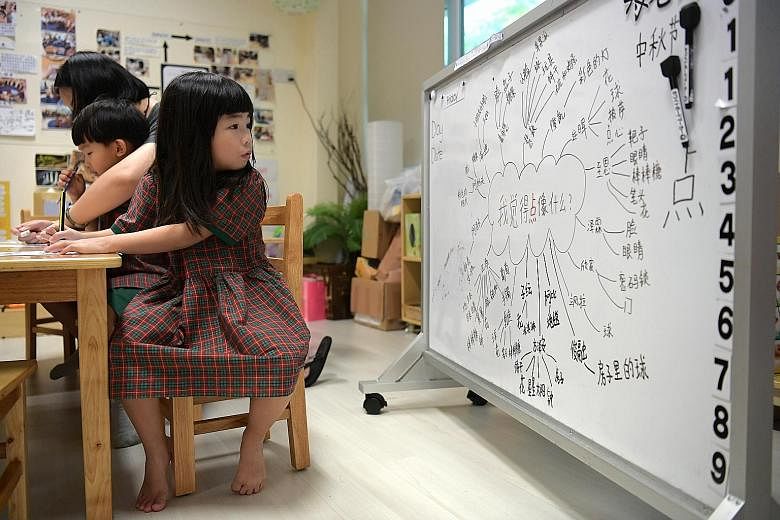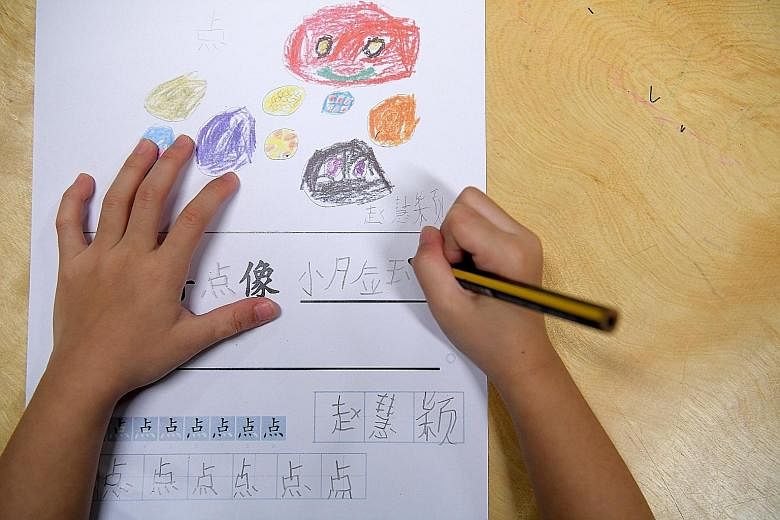Gone are the days of filling in blanks on worksheets and penmanship drills; pre-schools today are encouraging all sorts of creative learning, from guided play to using technology.
The EtonHouse chain has turned to "provocation pages", a term it coined to refer to learning methods designed to initiate ideas and imagination in children. These could be as varied as a storybook on friendship compiled from the work of all the children in a class, or artwork that represents the children's ideas or a skit put up by them.
Mrs Tina Stephenson-Chin, its director of pedagogy, told The Straits Times that about 60 per cent to 70 per cent of its pre-schools have done away with traditional worksheets and reading schemes that "don't reflect the progression of acquiring a language".
"Paper-based assessment is usually designed with an average child in mind. But there's always been debate about their usefulness.
"A Chinese worksheet, for instance, tends to test a child's knowledge of characters that are too complex, skipping too many stages in the learning process such as reading and writing characters," she said, adding that these worksheets limit a child's self-expression and do not capture fully the different learning needs of individual children .
But parents want to see that their children are learning something, said Mrs Stephenson-Chin.
"They believe in play, inquiry, but they're used to worksheets as a visual representation of learning."
That led a team of four pedagogy specialists to create learning materials based on elements of research in line with EtonHouse's beliefs, such as the process of inquiry, making visible children's contributions and progress and language-learning principles.
They also studied some of the practices teachers have already put into place. One was devised by Ms Jiang Yan, a senior Mandarin teacher in EtonHouse Bilingual Preschool, who came up with the idea of creating a book about friendship.
Each child contributes one page, featuring cut-outs of faces of their friends. The children then trace or write in Chinese about their chosen friends.
EtonHouse has shared some of these ideas, along with learning materials about provocation pages, with leadership teams across all its 15 pre-schools. They are now in the process of training the Chinese language teachers - more than 100 of them - to design their own projects.
Ms Denise Teo, one of the pedagogy specialists, said: "What's important to us is that the children enjoy learning and we provide that opportunity in early childhood.
"Rather than try to fit children into boxes, we want them to have more ownership of learning so that it's meaningful to them."
Parents said that the materials were helpful.
Ms Kam Sook Wei, whose five-year-old son attends the EtonHouse pre-school at Upper Bukit Timah Road, said: "As parents, it's nice to see these compilations and booklets and you know it's genuinely the kids' work because when you ask them, they remember and can talk about it."
Ms Kam, 35, who runs a business supplying coffee beans and reed diffuser oil, said she also appreciates that the lessons at EtonHouse "expand on the kids' interests", instead of the teacher deciding for them set topics all the time.
"My son loves geography, human anatomy and numbers," she added.
Ms Amanda Cho, 33, an operations manager whose daughter is in Kindergarten 1, said: "The provocation sheets are more open-ended and allow children to construct their own knowledge instead of just copying and having one answer to a question."
She cited an activity in which the children experimented with different objects such as marbles and styrofoam and recorded their weights, and if they floated or sank in water.
"The activity lets the children make their own observations and generate a hypothesis - not all heavy things sink and not all light things float," Ms Cho said.
"This process wouldn't have been reflected in a typical worksheet, which are more 'one size fits all'. Here, if a child writes something different, the teacher can understand the thinking process behind his or her answer."
No worksheets for MOE pre-schools
There are no pen-and-paper worksheets at the 15 kindergartens run by the Ministry of Education (MOE).
The teachers focus instead on observing the children throughout the year to understand their learning and development, a ministry spokesman said. "They document and interpret the information to find out what the children know, understand and can do. This helps our teachers to build on the children's learning and plan for future activities."
Children use activity sheets as part of the learning process, for example, to capture observations through drawing.
Every child also has a learning portfolio, which reflects his or her progress, through samples of their work, photographs of their involvement in activities and teachers' anecdotal notes.
The children are also given activities to complete with their parents at home. For instance, they could work together on tasks like creating a collage of sea creatures using magazines, newspapers and recycled materials.
These "provide continuity in the children's learning from the MOE kindergarten to home", said the spokesman.
"Parents are generally very supportive of the MOE kindergarten curriculum and learning activities. They typically do not request for traditional worksheets."
Amelia Teng



